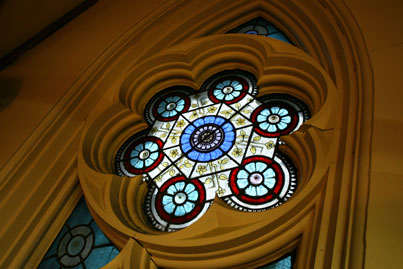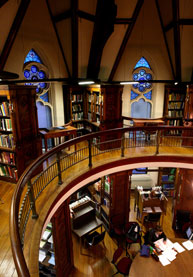
Stained glass window at the Islamic Studies Library.
Owen Egan
Beyond books
McGill's Libraries aren't what they used be... new look, more gear, better service, same eclectic charm

A new automated book return machine takes a load of the shoulders of Director of Libraries Janine Schmidt and Head Librarian, Information Services, Robert Clarke.
Owen Egan
Janine Schmidt can't help herself. You'd figure someone who Provost Tony Masi calls "the best director of libraries in the world," wouldn't have to do any more grunt work. But, there she is, in the middle of leading a tour of the revamped and restocked Humanities and Social Sciences Library, stopping to gently chide a user for putting her feet up on a plush new chair. "We'd like them to last a few years at least," Schmidt says with a wink. Later on the same walkabout, she comes across puddle of spilled coffee and is poised to mop it up herself when a staff member intercedes.
It's classic Schmidt - hands-on all the way. Since taking the reins of McGill's libraries in February 2005, the indefatigable Aussie has rolled up her sleeves and taken on the daunting task of improving the university's library system.
Of all McGill's 13 branch libraries, none is as big, as busy or as controversial as the Humanities and Social Sciences Library. Staff had heard it all going back to the days when card catalogues choked the entrance level; poor lighting, uncomfortable chairs, not enough individual study space, not enough group study space, too old and tired looking. Add to that the more modern kvetches of insufficient computer access and poor laptop space and it was a litany of complaints that spanned generations.

In a library like the Faculty of Religious Studies' Birks Reading Room, it's easy to get lost in your thoughts.
Owen Egan
A veteran of several library overhauls Down Under, Schmidt knew that your harshest critic is often your best ally. Enter the Students' Society of McGill University (SSMU) and the Post-Graduate Students' Society (PGSS). Schmidt and her team began meeting with them and getting a clearer picture of how users view the situation. When combined with recommendations coming from the Principal's Task Force on Student Life and Learning and five-years worth of data compiled by an ongoing web-based library survey and the picture became downright crystalline.
"It was a little dismaying to read," admits Schmidt. "Even though lots of people were happy with the services, there were many areas in which we could improve." Those areas included the physical facilities, the library web site, collections and services.
Facelifts and refurbishings

Owen Egan
It was decided that the major work would take place on the humanities library and the Barton Library at Macdonald campus (see sidebar).
"It was loud and clear from the students and the library staff that serves them that there were just not enough computers," says Robert Clarke, Principal Librarian, Information Services, who played a major role in the planning and implementation of the renovations. Despite adding some 25 new terminals, the demand for new hardware is still great. "No sooner would we install a computer than someone would jump in and start to use it," says Clarke.
Then there was the physical space of the entry floor of the Humanities library. "We had furniture that was older than many of our students," says Schmidt with a wry grin.
In the new study area, dingy old carrels and large tables that encouraged sprawling have been replaced with groups of smaller modules placed very close together. "If you give a person a boundary - even a small crack between tables - they feel more comfortable." As a result, the new study area runs at a much higher capacity than its predecessor - even though there is slightly less table surface.
Another civilizing and worldly addition is a new service is called Press Display, whereby as many as 250 to 300 newspapers from around the world can be accessed daily online. Of those, the library prints out more than 30 entire editions - exact tabloid replicas of the dailies - every day, for those who prefer to read them the old fashioned way.
The library has extended its opening hours as well as its service hours, to 10 pm, at which point it becomes a study hall until 12:45 am. Says Schmidt, "We are now employing our professional staff to provide more service hours, and we've improved the work environment considerably."
Most revolutionary, Schmidt says, is the recent launch of an online, real-time chat service for students seeking the help of a librarian. By going to www.mcgill.ca/library/ and clicking on "Ask a librarian" students can get answers to any of their reference and research questions and they don't even have to whisper.
As a frequent user of the library, Sarah Canzer, third year Political Science, is very pleased with the changes. "The extra computers are really useful," she says. "Before I couldn't even access my hotmail account. Now I've written whole essays here. It feels more like a library environment."
The Redpath section of the Humanities and Social Sciences Library will be open for study 24 hours a day, 7 days a week starting at 1:00 am, Tuesday, November 7, and ending at 8:00 am, Friday, December 22. A valid McGill ID card is required for access to the Library after 00:45 am. The Redpath main floor, as well as the Info Café and the cafeteria, will remain open overnight during this period.

